|
Books Should Be Free Loyal Books Free Public Domain Audiobooks & eBook Downloads |
|
|
Books Should Be Free Loyal Books Free Public Domain Audiobooks & eBook Downloads |
|
War Stories |
|---|
|
Book type:
Sort by:
View by:
|
By: Friedrich Schiller (1759-1805) | |
|---|---|
 The Piccolomini
The Piccolomini
| |
By: Friedrich von Bernhardi (1849-1930) | |
|---|---|
 Germany and the Next War
Germany and the Next War
| |
 Cavalry in Future Wars
Cavalry in Future Wars
| |
By: Fritz Kreisler | |
|---|---|
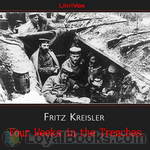 Four Weeks in the Trenches
Four Weeks in the Trenches
A brief record of the fighting on the Eastern front in the great war by a participant in that great and terrible conflict | |
By: Fritz Leiber (1910-1992) | |
|---|---|
 The Big Time
The Big Time
A classic locked room mystery, in a not-so-classic setting. (Intro by Karen Savage) | |
By: G. B. (George Brenton) Laurie (1867-1915) | |
|---|---|
 Letters of Lt.-Col. George Brenton Laurie (commanding 1st Battn. Royal Irish Rifles) Dated November 4th, 1914-March 11th, 1915
Letters of Lt.-Col. George Brenton Laurie (commanding 1st Battn. Royal Irish Rifles) Dated November 4th, 1914-March 11th, 1915
| |
By: G. E. (George Everett) Partridge (1870-) | |
|---|---|
 The Psychology of Nations A Contribution to the Philosophy of History
The Psychology of Nations A Contribution to the Philosophy of History
| |
By: G. F. (George Frederick) Abbott | |
|---|---|
 Greece and the Allies 1914-1922
Greece and the Allies 1914-1922
| |
By: G. P. Cuttriss | |
|---|---|
 Over the Top With the Third Australian Division
Over the Top With the Third Australian Division
| |
By: G. W. (George Warrington) Steevens (1869-1900) | |
|---|---|
 From Capetown to Ladysmith An Unfinished Record of the South African War
From Capetown to Ladysmith An Unfinished Record of the South African War
| |
By: Gaius Julius Caesar | |
|---|---|
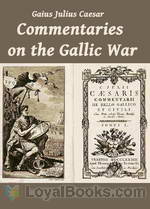 Commentaries on the Gallic War
Commentaries on the Gallic War
Commentarii de Bello Gallico (English: Commentaries on the Gallic War) is Julius Caesar's firsthand account of the Gallic Wars, written as a third-person narrative. In it Caesar describes the battles and intrigues that took place in the nine years he spent fighting local armies in Gaul that opposed Roman domination.The work has been a mainstay in the teaching of Latin to schoolchildren, its simple, direct prose lending itself to that purpose. It begins with the frequently quoted phrase "Gallia est omnis divisa in partes tres", sometimes quoted as "Omnia Gallia in tres partes divisa est", meaning "All Gaul is divided into three parts". | |
By: General Sir John Miller Adye (1819-1900) | |
|---|---|
 Indian Frontier Policy, an Historical Sketch
Indian Frontier Policy, an Historical Sketch
“The subject of our policy on the North-West frontier of India is one of great importance, as affecting the general welfare of our Eastern Empire, and is specially interesting at the present time, when military operations on a considerable scale are being conducted against a combination of the independent tribes along the frontier. It must be understood that the present condition of affairs is no mere sudden outbreak on the part of our turbulent neighbours. Its causes lie far deeper, and are the consequences of events in bygone years”. (From the author’s Preface, 1897). | |
By: Geoffrey H. Malins (1887-1943) | |
|---|---|
 How I Filmed the War
How I Filmed the War
An account of World War I and the experience of filming it by an early cinematographer (and, after the war, successful director) who was there. | |
By: Geoffrey Keith Rose (1889-) | |
|---|---|
 The Story of the 2/4th Oxfordshire and Buckinghamshire Light Infantry
The Story of the 2/4th Oxfordshire and Buckinghamshire Light Infantry
| |
By: George (Henry George August) Hartmann (1852-1934) | |
|---|---|
 Tales of Aztlan; the Romance of a Hero of our Late Spanish-American War, Incidents of Interest from the Life of a western Pioneer and Other Tales
Tales of Aztlan; the Romance of a Hero of our Late Spanish-American War, Incidents of Interest from the Life of a western Pioneer and Other Tales
| |
By: George A. (George Augustine) Taylor (1872-1928) | |
|---|---|
 The Sequel What the Great War will mean to Australia
The Sequel What the Great War will mean to Australia
| |
By: George A. Birmingham (1865-1950) | |
|---|---|
 Gossamer
Gossamer
| |
 A Padre in France
A Padre in France
| |
By: George Alfred Henty (1832-1902) | |
|---|---|
 The Tiger of Mysore
The Tiger of Mysore
During the Indian war with Tippoo Saib, 15 year old Dick Holland and his mother set out from England to find and rescue his father, shipwrecked 6 years earlier, and believed to be held prisoner by the 'Tiger of Mysore'. | |
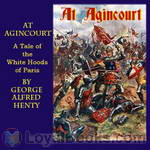 At Agincourt - White Hoods of Paris
At Agincourt - White Hoods of Paris
The story begins in a grim feudal castle in Normandie. The times were troublous, and soon the king compelled Lady Margaret de Villeroy, with her children, to go to Paris as hostages. Guy Aylmer went with her.Paris was turbulent. Soon the guild of the butchers, adopting white hoods as their uniform, seized the city, and besieged the house where our hero and his charges lived. After desperate fighting, the white hoods were beaten and our hero and his charges escaped from the city, and from France. (Summary from the original back cover) | |
 One Of The 28th - a Tale of Waterloo
One Of The 28th - a Tale of Waterloo
A tale of Victorian-style romance, maritime battles and even the penultimate Napoleanic battle - Waterloo. (Introduction by Mike Harris) | |
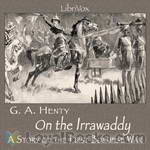 On the Irrawaddy, A Story of the First Burmese War(1897)
On the Irrawaddy, A Story of the First Burmese War(1897)
With the exception of the terrible retreat from Afghanistan, none of England's many little wars have been so fatal--in proportion to the number of those engaged--as our first expedition to Burma. It was undertaken without any due comprehension of the difficulties to be encountered, from the effects of climate and the deficiency of transport; the power, and still more the obstinacy and arrogance of the court of Ava were altogether underrated; and it was considered that our possession of her ports would assuredly bring the enemy, who had wantonly forced the struggle upon us, to submission... | |
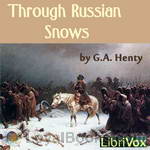 Through Russian Snows
Through Russian Snows
There are few campaigns that, either in point of the immense scale upon which it was undertaken, the completeness of its failure, or the enormous loss of life entailed, appeal to the imagination in so great a degree as that of Napoleon against Russia. Fortunately, we have in the narratives of Sir Robert Wilson, British commissioner with the Russian army, and of Count Segur, who was upon Napoleon's staff, minute descriptions of the events as seen by eye-witnesses, and besides these the campaign has been treated fully by various military writers... | |
 With Frederick The Great: A Story of the Seven Years' War
With Frederick The Great: A Story of the Seven Years' War
Among the great wars of history there are few, if any, instances of so long and successfully sustained a struggle, against enormous odds, as that of the Seven Years' War, maintained by Prussia--then a small and comparatively insignificant kingdom--against Russia, Austria, and France simultaneously, who were aided also by the forces of most of the minor principalities of Germany. The population of Prussia was not more than five millions, while that of the Allies considerably exceeded a hundred millions... | |
 Young Carthaginian
Young Carthaginian
Typically, Henty's heroes are boys of pluck in troubled times, and this is no different. Detailed research is embellished with a vivid imagination, especially in this novel set in the Punic wars, about which knowledge is limited: "...certainly we had but a hazy idea as to the merits of the struggle and knew but little of its events, for the Latin and Greek authors, which serve as the ordinary textbooks in schools, do not treat of the Punic wars. That it was a struggle for empire at first, and latterly... | |
 With Lee in Virginia
With Lee in Virginia
Vincent Wingfield is the son of a wealthy Virginian planter. When the country goes to war, he enlists in the cavalry, and sees action under the various generals commanding the army in and near Virginia. He has several private adventures as well, including a personal enemy, prison escape, rescue of a young lady, spying expedition, and recovery of a stolen slave. He rises in rank in the Confederate army, and after the war is over, he marries and returns home to manage his mother's plantation. Henty in this book gives an overview of the causes of the Civil War, and follows the battles and movements of the army in Virginia and the surrounding area... | |
 At the Point of the Bayonet: A Tale of the Mahratta War
At the Point of the Bayonet: A Tale of the Mahratta War
The story of the war in which the power of the great Mahratta confederacy was broken ended in the firm establishment of the British Empire the Indian Peninsula. When the struggle began, the Mahrattas were masters of no small portion of India; their territory comprising the whole country between Bombay and Delhi, and stretching down from Rajputana to Allahabad; while in the south they were lords of the district of Cuttack, thereby separating Madras from Calcutta. The jealousies of the great Mahratta... | |
 The Lion of the North A tale of the times of Gustavus Adolphus
The Lion of the North A tale of the times of Gustavus Adolphus
| |
 Bonnie Prince Charlie: a Tale of Fontenoy and Culloden
Bonnie Prince Charlie: a Tale of Fontenoy and Culloden
This is a tale of the son of a Scottish officer, who gets arrested for helping a Jacobite agent. Set during the Jacobite rebellion in Scotland in 1755, the boy escapes and makes it to France and shares some adventures with Prince Charlie. | |
 At Aboukir and Acre A Story of Napoleon's Invasion of Egypt
At Aboukir and Acre A Story of Napoleon's Invasion of Egypt
| |
 Won By the Sword : a tale of the Thirty Years' War
Won By the Sword : a tale of the Thirty Years' War
| |
 The Cornet of Horse A Tale of Marlborough's Wars
The Cornet of Horse A Tale of Marlborough's Wars
| |
 By Sheer Pluck, a Tale of the Ashanti War
By Sheer Pluck, a Tale of the Ashanti War
| |
 The Bravest of the Brave — or, with Peterborough in Spain
The Bravest of the Brave — or, with Peterborough in Spain
| |
 Through Three Campaigns A Story of Chitral, Tirah and Ashanti
Through Three Campaigns A Story of Chitral, Tirah and Ashanti
| |
 With Wolfe in Canada The Winning of a Continent
With Wolfe in Canada The Winning of a Continent
| |
 The Young Franc Tireurs And Their Adventures in the Franco-Prussian War
The Young Franc Tireurs And Their Adventures in the Franco-Prussian War
| |
 For Name and Fame Or Through Afghan Passes
For Name and Fame Or Through Afghan Passes
| |
 With Buller in Natal, Or, a Born Leader
With Buller in Natal, Or, a Born Leader
| |
By: George Barton (1866-1940) | |
|---|---|
 Angels of the Battlefield
Angels of the Battlefield
"Angels of the Battlefield: A History of the Labors of the Catholic Sisterhoods in the Late Civil War" chronicles the compassionate services of these dedicated women during the bitter and bloody U.S. Civil War. These accounts also offer some important historical details, giving some important insights into the people and events of the war. This is the Second Edition, Revised and Enlarged. - Summary by Larry Wilson | |
By: George Bethune English (1787-1828) | |
|---|---|
 A Narrative of the Expedition to Dongola and Sennaar
A Narrative of the Expedition to Dongola and Sennaar
As a second lieutenant in the United States Marine Corps during the War of 1812 assigned to Marine Corps headquarters, English sailed to the Mediterranean, and was among the first citizens of the United States known to have visited Egypt. Shortly after arriving in Egypt he resigned his commission, converted to Islam and joined Isma'il Pasha in an expedition up the Nile River against Sennar in 1820, winning distinction as an officer of artillery. He published his Narrative of the Expedition to Dongola and Sennaar (London 1822) regarding his exploits. (Introduction adapted by obform from Wikipedia) | |
By: George Brinton McClellan (1826-1885) | |
|---|---|
 McClellan's Own Story
McClellan's Own Story
Memoirs of General George Brinton McClellan, commanding general of the Army of the Potomac during the early years of the American Civil War. The work covers the time that McClellan commanded the Army of the Potomac, including the Peninsula Campaign, the Seven Days' Battles, and the Battle of Antietam. | |
By: George Cary Eggleston (1839-1911) | |
|---|---|
 The Big Brother A Story of Indian War
The Big Brother A Story of Indian War
| |
By: George Cooreman (1852-1926) | |
|---|---|
 Martyrdom Of Belgium; Official Report Of Massacres Of Peaceable Citizens, Women And Children By The German Army; Testimony Of Eye-Witnesses
Martyrdom Of Belgium; Official Report Of Massacres Of Peaceable Citizens, Women And Children By The German Army; Testimony Of Eye-Witnesses
The title says it all. World War I narratives of German activities in Belgium after the German invasion of this neutral country. - Summary by david wales | |
By: George Davidson | |
|---|---|
 The Incomparable 29th and the "River Clyde"
The Incomparable 29th and the "River Clyde"
| |
By: George Eggleston (1839-1911) | |
|---|---|
 Rebel's Recollections
Rebel's Recollections
George Cary Eggleston's Civil War memoir begins with a separate essay on the living conditions and political opinions of Virginia’s citizenry before secession. The body of the work contains vivid descriptions and accounts of the men and women of the South during the time of the Confederacy. Eggleston praises its war heroes, Robert E. Lee, Stonewall Jackson, and Jeb Stuart, but is highly critical of Jefferson Davis and of his government’s inefficiencies, red-tape, and favoritism. The book concludes with the war's end and a tribute to the character of the newly freed slaves... | |
By: George G. (George Gallie) Nasmith (1877-1965) | |
|---|---|
 On the Fringe of the Great Fight
On the Fringe of the Great Fight
| |
By: George Gibbs (1870-1942) | |
|---|---|
 The Secret Witness
The Secret Witness
| |
 Golden Bough
Golden Bough
The eyes of the Légionnaire, now grown accustomed to the glow of the light, made sure that the figure had not moved, nor was aware of his silent and furtive approach. Two plans of action suggested themselves, one to move behind the foliage to the right and intercept the monk with the lantern should he attempt to flee toward the lights of the house nearby, the other to risk all in a frank statement, a plea for charity and asylum. (A selection from Chapter 1. ) | |
By: George Griffith (1857-1906) | |
|---|---|
 Angel of the Revolution
Angel of the Revolution
The Angel of the Revolution: A Tale of the Coming Terror (1893) is a science fiction novel by English writer George Griffith. It was his first published novel and remains his most famous work. It was first published in Pearson's Weekly and was prompted by the success of The Great War of 1892 in Black and White magazine, which was itself inspired by The Battle of Dorking. A lurid mix of Jules Verne's futuristic air warfare fantasies, the utopian visions of News from Nowhere and the future war invasion literature of Chesney and his imitators, it tells the tale of a group of terrorists who conquer the world through airship warfare... | |
By: George Harvey Ralphson (1879-1940) | |
|---|---|
 Boy Scouts Mysterious Signal or Perils of the Black Bear Patrol
Boy Scouts Mysterious Signal or Perils of the Black Bear Patrol
| |
 Boy Scouts in the North Sea The Mystery of a Sub
Boy Scouts in the North Sea The Mystery of a Sub
| |
By: George Henry Makins (1853-) | |
|---|---|
 Surgical Experiences in South Africa, 1899-1900 Being Mainly a Clinical Study of the Nature and Effects of Injuries Produced by Bullets of Small Calibre
Surgical Experiences in South Africa, 1899-1900 Being Mainly a Clinical Study of the Nature and Effects of Injuries Produced by Bullets of Small Calibre
| |
By: George Herbert Fosdike Nichols | |
|---|---|
 Pushed and the Return Push
Pushed and the Return Push
| |
By: George Lynch (1868-1928) | |
|---|---|
 Impressions of a War Correspondent
Impressions of a War Correspondent
| |
By: George Manington | |
|---|---|
 Soldier Of The Legion;
Soldier Of The Legion; An Englishman's Adventures Under The French Flag in Algeria And Tonquin An educated gentleman, Mr Manington has given an insight into the unusual experiences of an Englishman in the French Foreign Legion, such as no ordinary "mercenary" could have done. Most of the narrative deals with Tonquin, and the fighting there against the rebels in their forest fastnesses. Incidentally, in giving an account of his friendship for the native sergeant, Doy-Tho, the author has been able to impart to the pages of the book an Oriental atmosphere that we think will prove attractive to the reader. - Summary by Editors' Note | |
By: George Pearson | |
|---|---|
 The Escape of a Princess Pat
The Escape of a Princess Pat
Being the full account of the capture and fifteen months’ imprisonment of Corporal Edwards, of the Princess Patricia’s Canadian Light Infantry, and his final escape from Germany into Holland. | |
By: George T. McCarthy | |
|---|---|
 The Greater Love
The Greater Love
| |
By: George William Cox (1827-1902) | |
|---|---|
 Crusades
Crusades
The Crusades were a series of religious wars fought between 1096 and 1272 to recover the Holy Land from Islamic rule. According to the Latin Church, Crusaders were penitent pilgrims whose sins were forgiven. British historian, George Cox, writes of the churchmen, great and small, who inspired the Crusades, of the warriors who left families and lands behind, of the wily Venetian merchants and Byzantine emperors who exploited the knights, and of the valor of the Saracens. Here are accounts of sublime sacrifice and bestial ferocity, of dynastic conflict within the Crusader States, of sieges, starvation, pestilence, and ambush, and of the clash and interpenetration of two cultures... | |
By: George-Günther Freiherr von Forstner (1882-1940) | |
|---|---|
 The Journal of Submarine Commander Von Forstner
The Journal of Submarine Commander Von Forstner
The Journal of Submarine Commander Von Forstner is a graphic account of WWI submarine warfare. Forstner was the commander of German U-boat U-28. His journal, first published 1916, gives a gritty picture of daily life inside a submarine and details several torpedo attacks on Allied shipping. The 1917 translation of Forstner’s journal into English was unquestionably intended to bolster the Allied war effort. In the foreword, the translator states: “Nothing at the present day has aroused such fear as this invisible enemy, nor has anything outraged the civilized world like the tragedies caused by the German submarines... | |
By: Georges Duhamel (1884-1966) | |
|---|---|
 The New Book of Martyrs
The New Book of Martyrs
| |
By: Gerald B. (Gerald Berkeley) Hurst (1877-1957) | |
|---|---|
 With Manchesters in the East
With Manchesters in the East
| |
By: Gerald Featherstone Knight (1894-) | |
|---|---|
 'Brother Bosch', an Airman's Escape from Germany
'Brother Bosch', an Airman's Escape from Germany
| |
By: Giles Lytton Strachey (1880-1932) | |
|---|---|
 Eminent Victorians
Eminent Victorians
On Modern Library's list of 100 Best Non-Fiction books, "Eminent Victorians" marked an epoch in the art of biography; it also helped to crack the old myths of high Victorianism and to usher in a new spirit by which chauvinism, hypocrisy and the stiff upper lip were debunked. In it, Strachey cleverly exposes the self-seeking ambitions of Cardinal Manning and the manipulative, neurotic Florence Nightingale; and in his essays on Dr Arnold and General Gordon, his quarries are not only his subjects but also the public-school system and the whole structure of nineteenth-century liberal values. | |
By: Gipsy Smith (1860-1947) | |
|---|---|
 Your Boys
Your Boys
| |
By: Glenna Lindsley Bigelow | |
|---|---|
 Liége on the Line of March An American Girl's Experiences When the Germans Came Through Belgium
Liége on the Line of March An American Girl's Experiences When the Germans Came Through Belgium
| |
By: Gordon Bates | |
|---|---|
 The Khaki Boys over the Top Doing and Daring for Uncle Sam
The Khaki Boys over the Top Doing and Daring for Uncle Sam
| |
By: Grace Ellery Channing (1862-1937) | |
|---|---|
 Any Woman To A Soldier
Any Woman To A Soldier
volunteers bring you 14 recordings of Any Woman To A Soldier by Grace Ellery Channing. This was the Weekly Poetry project for November 4, 2018. Grace Ellery Channing was a writer and poet who published often in The Land of Sunshine. Channing began her career as a writer by editing her grandfather's memoirs, Dr. Channing's Notebook . She became an associate editor of The Land of Sunshine , and in her tenure as a writer and poet contributor to the publication, advocated for an increased reliance on Mediterranean practices for Los Angelenos. This included embracing the sun instead of avoiding it, eating lighter food, and taking in wine and afternoon naps. - Summary by Wikipedia | |
By: Grace Livingston Hill (1865-1947) | |
|---|---|
 The War Romance of the Salvation Army
The War Romance of the Salvation Army
| |
By: Great Britain. Army. Highland Light Infantry. Battalion, 5th | |
|---|---|
 The Fifth Battalion Highland Light Infantry in the War 1914-1918
The Fifth Battalion Highland Light Infantry in the War 1914-1918
| |
By: Great Britain. War Office | |
|---|---|
 History of the War in South Africa 1899-1902 v. 1 (of 4) Compiled by Direction of His Majesty's Government
History of the War in South Africa 1899-1902 v. 1 (of 4) Compiled by Direction of His Majesty's Government
| |
By: Grover Cleveland (1837-1908) | |
|---|---|
 State of the Union Addresses by United States Presidents (1893 - 1896)
State of the Union Addresses by United States Presidents (1893 - 1896)
The State of the Union address is a speech presented by the President of the United States to a joint session of the United States Congress, typically delivered annually. The address not only reports on the condition of the nation but also allows the President to outline his legislative agenda and national priorities. This album contains recordings of addresses from Grover Cleveland's second term. - Summary by Wikipedia | |
By: Gustavus Woodson Smith (1822-1896) | |
|---|---|
 Company 'A', corps of engineers, U.S.A., 1846-'48, in the Mexican war
Company 'A', corps of engineers, U.S.A., 1846-'48, in the Mexican war
| |
By: Guy Thornton (1872-1934) | |
|---|---|
 With the Anzacs in Cairo
With the Anzacs in Cairo
Guy Thornton recounts his experiences serving as a military chaplain with the Australian and New Zealand Army Corps while stationed in Egypt during World War I. His writing is opinionated, emotionally vulnerable, and written in very colorful, vivid prose. He recounts both his successes and failures as a pastor. Of particular concern to Thornton, are his soldiers’ interactions with the Wasa'a- the red-light district of Cairo which was popular with the soldiers who often patronized prostitutes. Thornton also expresses his experiences exploring Cairo, his work as a chaplain, and the various social services catering to soldiers. - Summary by Adam Bielka | |
By: H. Beam Piper (1904-1964) | |
|---|---|
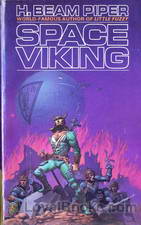 Space Viking
Space Viking
A galactic war has left the Terran Federation in ruins. Formerly civilized planets have decivilized into barbarism. Space Vikings roam the wreckage, plundering and killing for gain. Lord Lucas Trask of Traskon was no admirer of the Space Vikings, but when murder takes his wife on his wedding day, Trask trades everything he has for his own Space Viking ship and sets out on a galaxy-wide quest for revenge. | |
 Null-ABC
Null-ABC
"There's some reaction these days that holds scientists responsible for war. Take it one step further: What happens if "book-learnin'" is held responsible ...?" | |
By: H. C. W. Bishop | |
|---|---|
 A Kut Prisoner
A Kut Prisoner
| |
By: H. G. Wells (1866-1946) | |
|---|---|
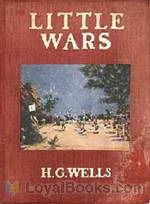 Little Wars (A Game for Boys)
Little Wars (A Game for Boys)
Miniature wargaming got its start with the publication in 1913 of this thoroughly entertaining little account of how H.G. Wells, with certain of his friends, took their childhood toys and turned play into acceptable middle-aged sport by subjecting the exercise to the civilizing influence of actual rules. While wargaming progressed far past these beginnings, Wells observes how “little wars” with even his elementary rules can suggest the wholesale crudity of the real thing. “You have only to play at Little Wars three or four times to realise just what a blundering thing Great War must be... | |
 The War in the Air
The War in the Air
War in the Air was written during a prolific time in H. G. Wells's writing career. Having withdrawn from British politics to spend more time on his own ideas, he published twelve books between 1901 and 1911, including this one. while many British citizens were surprised by the advent of World War I, Wells had already written prophetically about such a conflict. War in the Air predicted use of airplanes in modern war. | |
 War and the future: Italy, France and Britain at war
War and the future: Italy, France and Britain at war
| |
 Mr. Britling Sees It Through
Mr. Britling Sees It Through
"Mr. Britling Sees It Through" is H. G. Wells' attempt to make sense of World War I. It begins with a lighthearted account of an American visiting England for the first time, but the outbreak of war changes everything. Day by day and month by month, Wells chronicles the unfolding events and public reaction as witnessed by the inhabitants of one house in rural Essex. Each of the characters tries in a different way to keep their bearings in a world suddenly changed beyond recognition. This book was published in 1916 while the war was still in progress, so no clear resolution was possible... | |
By: H. Irving Hancock (1868-1922) | |
|---|---|
 Uncle Sam's Boys with Pershing's Troops Dick Prescott at Grips with the Boche
Uncle Sam's Boys with Pershing's Troops Dick Prescott at Grips with the Boche
| |
By: H. O. (Henry Osmond) Lock (1879-) | |
|---|---|
 With the British Army in The Holy Land
With the British Army in The Holy Land
| |
By: H. Taprell (Henry Taprell) Dorling (1883-1968) | |
|---|---|
 Stand By! Naval Sketches and Stories
Stand By! Naval Sketches and Stories
| |
By: Hall Caine (1853-1931) | |
|---|---|
 The Drama Of Three Hundred & Sixty-Five Days Scenes In The Great War
The Drama Of Three Hundred & Sixty-Five Days Scenes In The Great War
| |
By: Halsey Davidson | |
|---|---|
 Navy Boys Behind the Big Guns Sinking the German U-Boats
Navy Boys Behind the Big Guns Sinking the German U-Boats
| |
By: Hamilton Brock Fuller | |
|---|---|
 On the Firing Line
On the Firing Line
| |
By: Harold Ashton (1875-1919) | |
|---|---|
 Private Pinkerton Millionaire
Private Pinkerton Millionaire
The sketches and stories in this little volume must be read as fiction. But they are all, or nearly all, founded on fact, and built up from scenes and incidents I myself either witnessed or heard, first-hand, during my sojourn in France and Flanders as Special Correspondent for a London morning newspaper. Private Pinkerton I met in the flesh several times—a gallant young English gentleman, if there ever was one, a cool and clever fighter, a dead shot, but shy as a schoolgirl when it came to the telling of his own adventures. I have rarely met a millionaire so engaging, so kindly, so well loved by 'the boys', but so courageous withal. | |
 First From the Front
First From the Front
In this brief book I have lifted a very small corner of the curtain of war, to tell of my adventures — a week in the North Sea, and a breathless score of days in Northern France. I have touched upon both Tragedy and Comedy as they came my way. The tragedy is terrible enough - I have put it down plainly and unvarnished. From Tragedy to Comedy, it is but a step, along the gloomiest corridor of life one sees the flash of the cap and hears the rattle of the bells. Otherwise, it would be unbearable... | |
By: Harold Harvey | |
|---|---|
 A Soldier's Sketches Under Fire
A Soldier's Sketches Under Fire
| |
By: Harold Reginald Peat (1893-1960) | |
|---|---|
 Private Peat
Private Peat
| |
By: Harold W. (Harold Williams) Picton (1867-) | |
|---|---|
 The Better Germany in War Time Being some Facts towards Fellowship
The Better Germany in War Time Being some Facts towards Fellowship
| |
By: Harriet Julia Campbell Jephson | |
|---|---|
 A War-time Journal, Germany 1914 and German Travel Notes
A War-time Journal, Germany 1914 and German Travel Notes
| |
By: Harriot Stanton Blatch (1856-1940) | |
|---|---|
 Mobilizing Woman-Power
Mobilizing Woman-Power
| |